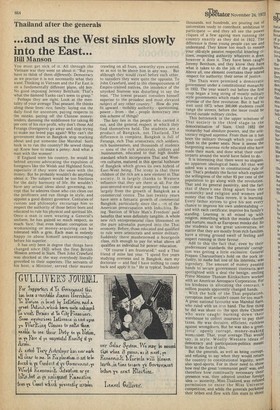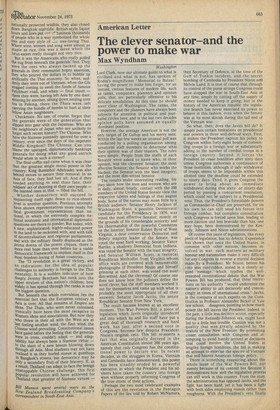...and as the West sinks slowly into the East...
Bill Manson
You must get sick of it. All through the Vietnam war they went on about it: "But you have to think of them differently. Democracy as we practise it is not necessarily what they want. Thinking in Vietnam and the Far East is, on a fundamentally different plane, old boy. No good imposing Jeremy Bentham. That's what the damned Yanks can't seem to grasp."
Perhaps they are right. Look at the mentality of your average Thai peasant. He thinks along these lines: rice, family, laying out the daily food for ancestors, paying respects to the monks, paying off the Chinese moneylenders, damning the middlemen for taking 60 per cent of his rice profit, why don't those Aid Ferangs (foreigners) go away and stop trying to make me breed pigs again? Why can't the government down in Bangkok stop mucking about and put someone like Marshal Sarit back in to run the country? He sewed things up. Knew how to make a penny. And what a man with the women!
If England were his country, he would be behind anyone advocating the expulsion of foreigners like the Welsh and Highland Scots, especially if they were the ones with the money. But he probably wouldn't do anything about it. The subject would be too fractious for the daily harmony of life. He wouldn't have any actual ideas about governing, except that he admires those who can clean out the profiteers and run things in style, and appoint a good district governor. Centuries of custom and philosophy encourage him to respect the authority of those better born and educated to rule his physical and spiritual life. Once a man is seen wearing a General's uniform, he has gained so much respect, so much 'face,' that even blatant corruption or womanising or money-acquiring can be tolerated with a grin. Each man is entirely happy to abase himself unquestioningly before his superior.
It has only been in degree that things have changed since 1821 when the first British Mission arrived in Siam. Then John Crawfurd was shocked at the way everybody literally grovelled to their superiors. The servants of his host, a Minister, served their master crawling on all fours, unworthy eyes averted, so as not to be above him in any way. But although they would crawl before each other, to outsiders they were quite the opposite. To John Crawfurd, used to the obsequiousness of .Empire-trained natives, the insolence of the unyoked Siamese was disturbing to say the least. "The lowest peasant considers himself superior to the proudest and most elevated subject of any other country." How do you fit upward mobility authority questioning. power from the people democracy into this scheme of things?
The key lies in the people who carried it out, and the general respect in which they find themselves held. The students are a product of Bangkok, not Thailand. The difference is complete. Bangkok is full of Ferangs, rich Thai aristocrats, rich soldiers, rich businessmen, and thousands of students — sons of the rich aristocrats, soldiers and businessmen, educated to that high doublestandard which incorporates Thai and West ■ -xn cultures, matured in this special hothouse of Bangkok which grows its own hybrid of East-West being. The irony is that these children of the rich are a new element in Thai society. It is largely thanks to Western influence that they are there at all. For the post-second-world-war prosperity has come largely from the grqwth of Bangkok as a commercial centre. The last twenty years have seen a fantastic growth of commercial Bangkok, particularly since the in of the American preoccupation with Indochina. Being 'Bastion of White Man's Freedom' paid benefits that were definitely tangible. A whole new rich entrepreneurial class blossomed on the pure adrenalin pumped into the Thai economy. Before, those educated and qualified to rule were aristocrats and senior military. Suddenly there mushroomed a bourgeois class, rich enough to pay for what above all qualifies an individual for power: education.
"Of course I am frustrated," said a Thai friend of mine last year. "I spend five years studying overseas and in Bangkok, earn my doctorate — arid find I have nothing to come back and apply it to." He is typical. Suddenly
thousands, not hundreds, are pouring out of universities ready to contribute, ambitious to participate — and they all see the power cliques of a few ageing men running the country exactly as they did in 1932. The difference is these young people can see and understand. They know too much to remain your old-style passive respectful kneeling citizen, respecting authority whatever it does, however it does it. They have been taught Jeremy Bentham, and they know they haVtl what it takes to do the job of the generals. Above all, one element overtakes their inbred respect for authority: their sense of justice.
The Thais were promised a democratic government under a constitutional monarchy in 1932. The year wasn't out before the first coup began a long string of mostly military style governments which made a farce of the promise of the first revolution. But it had to wait until 1973, when 200,000 students could range the streets, before the issue could be forced outside military circles.
This bottleneck in the upper echelons of Thai society is the third stage in the democratisation of Siam. Until 1932 the monarchy had absolute powers, and the aristocracy reigned supreme. From then on it has been the military through which you could climb to the power seats. Now it seems the burgeoning nouveau riche educated elite have made their mark, and done what their counterparts around the world have failed to do.
It is interesting that there were no slogans. no apparent ideological basis. All that was asked was a return to constitutional rule of law. That's probably the factor which explains the willingness of the other 95 per cent of the population to go along with the revolution. That and its general passivity, and the fact that if there's one thing apart from the monarchy and religion and women and money that the Thais revere, it is learning. Every father strives to give his son every chance to improve his own understahding -and with each certificate, improve his family's standing. Learning is all mixed up with religion, something which the monks cherish and nurture, much as European monks did. So the students at the great universities, no matter that they are mostly from rich families, have a strong ground swell of feeling and respect running in their favour.
• Add to this the fact that, even by their predecessors' standards, the generals' corruption was getting a little excessive. General Prapass Charusathien's hold on the pork industry, to narhe but one of his interests, was legendary. The amount of money passing hands to secure government contracts Was spotlighted with a deal the benign, smiling Prime Minister Thanom Kittikachorn worked with an American Aerospace Corporation. For his kindness in allocating the contract, a million pounds apparently changed hands.
With the bulk of the Thai population. corruption itself wouldn't count for too much. A great national favourite was Marshal .Sarit, who ruled with an iron hand. The first thing he did was shoot on the spot three Chinese who were caught burning down their warehouse to collect insurance to pay their taxes. He was decisive, efficient, ruthless against wrongdoers. But he was also a great. jovia', openly corrupt, money-making womoniser. That, your average Thai would say, is style. Woolly Western ideas of democracy and participation-politics meant
'little in the face of this. •
But the generals, as well as being corrupt, and refusing to say when they would return the country to constitutional legality, were also spoil-sports. For in their need to shoW how real the great 'communist'perir was, and therefore how continually necessary their presence was, they adopted another foreign idea — austerity, Miss, Thailand was refused permission to enter the Miss Universe competition, and while the generals pocketed their bribes and flew with film stars to shoot nationally protected wildlife, they also closed down Bangkok nightlife: British-style liquor hours and laws put cwt. business thousands of people who in a way symbolised the whole
free and easy style of tree-loving Thai. Where wine, women and song were almost as staple as rice, this was a move which the lotus-eaters really thought not very nice.
BLit it was the Americans who really pulled the rug from beneath the generals' feet. They were the ones who always backed up the generals in their communist bogey assertion, they who poured the dollars in to bubble up artificially the Thai economy. So when, suddenly they were out of Vietnam, when the GIs stopped coming to swell the funds of famous Petehburi road, and when — final insult — there they were, having left Asia by one door, entering by another, sitting down smiling over tea in Peking. there the Thais were, left carrying the bundle of bombs to hurl at their fellow Asian neighbours.
Checkmate. No one, of course, forgot that the generals were of the generation that Slipped into gear with the Japanese. Who are the neighbours of Japan who are unlikely to forget such recent history? The Chinese. Who have the Siamese pointedly ignored for over a century, ever since the days of the impotent Middle Kingdom? The Chinese. Can you blame the upstaged, diplomatically bankrupt generals for doing what any good ostrich Would when in such a corner?
The final coffin nail came when it was clear that the greatest single moral power in the country, King Bumiphol Adulyadej was also behind moves to secure their removal. In an Asia of face, they had lost all. And if they needed anything to seal their fate, their soldiers' act of shooting at their own people — the learned ones at that — filled the bill.
• Whether democracy will succeed in implanting itself right down to rice-shoots level is another question. Previous attempts have shown representatives more ready for local government representation than national, in which the extremely complex national economic and international diplomatic questions are theirs to ponder. But today, with a new, sophisticated, highly-educated power in the land to be reckoned with, and with talk of decentralisation and regional parliaments, and with the military finally displaced as the Prima donna of the power cliques, there is More real hope than ever before for a viable democratic framework to implant itself in this Most freedom-loving of Asian countries. The '73 revolution is a great victory, and an indication: for the idea of popular Challenges to authority is foreign to the Thai Mentality. It is a sudden indicator of how deeply Jeremy Bentham has sunk into the Upper stratum of this nation's children; how widely it has spread through the ranks is now the biggest question. But beneath the whole convulsion lies the .essential fact that the European century in Asia is over. All that remains of Empire are ideas. The Thais, who were never colonised, ironically have been the most receptive to Western ideas and associations. But now they Who threw in their all with the West are at last feeling another wind, the East wind, the Chinese wind prevailing. Constitutional issues have paled before the feeling that the generals Were in irons, couldn't adapt — and adap tability has always been a Siamese virtue — to the slant of a new breeze blowing down through all Asia. Most students may not have realised it as they hurled stones at gunshops in Bangkok's streets, but democracy may be
Only a secondary fruit, of their bravery. If, as a result, Thailand can adapt to face the benign 'unstoppable Chinese challenge, this first Popular revolution will have achieved for Thailand that greatest of Siamese virtues — Bill Manson spent several years as the New Zealand Broadcasting Company's comes
pondent in South-East Asia.



































 Previous page
Previous page